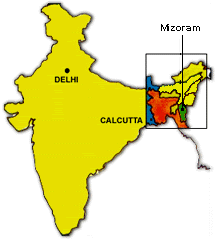Poor farmers in Mizoram to benefit massively from oil palm plan
 The North-eastern state of Mizoram, which is squeezed between Bangladesh and Burma, is one of India's poorest. Already under British rule, Mizoram was considered to be 'backward', because inhabited by 'tribal' people whose lands were not easily accessible and who (successfully) resisted the Raj. This discourse still reigns in India today. Mizoram is located far away from Delhi and Mumbai, geographically as well as conceptually. The state is left to care for itself, and doesn't enjoy the benefits of India's booming economy.
The North-eastern state of Mizoram, which is squeezed between Bangladesh and Burma, is one of India's poorest. Already under British rule, Mizoram was considered to be 'backward', because inhabited by 'tribal' people whose lands were not easily accessible and who (successfully) resisted the Raj. This discourse still reigns in India today. Mizoram is located far away from Delhi and Mumbai, geographically as well as conceptually. The state is left to care for itself, and doesn't enjoy the benefits of India's booming economy.These conditions have led all kinds social and political movements to spring up, and the people of Mizoram have been demanding and taking a high degree of independence from the central government. Though poor as it is, the state has one of the highest rates of precipitation on the planet, making it suitable for the cultivation of lucrative energy crops that demand humid conditions and high temperatures. Bamboo is one such crop, and it has been recognized as a major energy crop for the state. Striving towards energy independence, Mizoram aims to fuel its future with the biomass from the woody grass (earlier post).
The climate and soils in Mizoram are also favorable to that other high-potential energy crop, palm oil. The State government has therefor launched a major plan to establish palm plantations with the aim of alleviating poverty. It intends to start exporting the oil to the world market, where demand is growing rapidly, boosted by the thirst for palm oil as a biodiesel feedstock.
The 5-year, €130/US$165 million plan falls under the so-called Mizoram Intodelhna Programme (MIP) (which can be translated as 'Mizoram Self-sufficiency Program'), aimed at enhancing food and fuel security and better livelihoods for poor cultivators.
The Mizoram government is bringing together agro-industrial companies, multinationals and cooperatives to implement the scheme. Godrej Agvovet Limited, Foods Fats and Fertilizers Ltd and Palmtech India have committed to investing €43/US$55 million each to start their work to develop oil palm trees on an area of 100,000 hectares in the Kolasib, Mamit, Serchhip and Lunglei districts of the state. Agriculture minister H. Rammawi says "The detailed survey by the multinationals clearly indicated that the climatic conditions of the state are best suited for the cultivation [of oil palms]".
The agreements between the state and the private companies include the procurement of oil palm planting materials, establishing nurseries, supplying seedlings, providing agronomic assistance to the palm farmers and processing of the oil palm fruits.
Major income boost for poor farmers
State agriculture assistant director P Battacharaya said over 5000 farmers and their families across the state would benefit from the project. He stressed that "within seven years, a farmer is expected to earn a minimum of 50,000 rupees [US$860/US$1100] per annum provided he utilises his two-hectares of land to plant 150 trees for the oil palm cultivation." Average per capita incomes in the state are around 20,000 rupees per year. Mr Battacharaya added that "This oil palm scheme will not only benefit the farmers but also hundreds of unemployed youths across the state." Plantation companies are already recruiting agriculture graduates for this project, offering them monthly salaries of Rs 10,000-15,000 initially:
 biodiesel :: biomass :: bioenergy :: biofuels :: energy :: sustainability :: palm oil :: poverty :: Mizoram ::
biodiesel :: biomass :: bioenergy :: biofuels :: energy :: sustainability :: palm oil :: poverty :: Mizoram ::These companies would also help the farmers avail loan from the commercial and cooperative banks for the cultivation.
Besides, Mr Bhattacharya said the primary objective of this huge project is to control shifting 'Jhum' (slash and burn) cultivation as well as to cultivate alternative crops during the bamboo flowering. (Bamboo flowering, which occurs only once every few decades, is a very dangerous event, because it threatens to destroy the entire crop. This is currently happening in North-eastern India, and it is seen as a real economic catastrophy.)
Meanwhile, the state government has also chalked out various programmes to identify another 10,000 hectares of land for the red oil palm cultivation to be soon tendered among several other global companies.
More information:
The Hindu: Mizoram to export palm oil by 2010 - Sept. 25, 2006
Daily India: Rs.850 mn to tackle bamboo flowering in northeast - Sept. 29, 2006
 -------------------
-------------------
 Spanish company Ferry Group is to invest €42/US$55.2 million in a project for the production of biomass fuel pellets in Bulgaria.
The 3-year project consists of establishing plantations of paulownia trees near the city of Tran. Paulownia is a fast-growing tree used for the commercial production of fuel pellets.
Spanish company Ferry Group is to invest €42/US$55.2 million in a project for the production of biomass fuel pellets in Bulgaria.
The 3-year project consists of establishing plantations of paulownia trees near the city of Tran. Paulownia is a fast-growing tree used for the commercial production of fuel pellets.









0 Comments:
Post a Comment
Links to this post:
Create a Link
<< Home